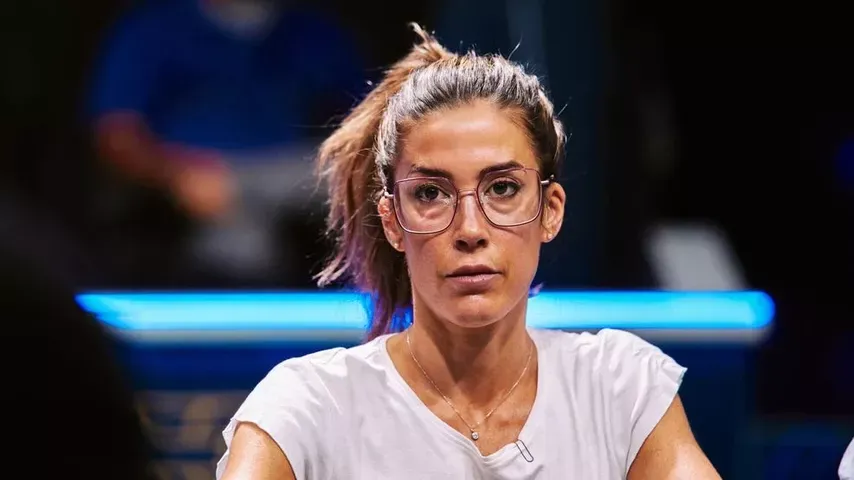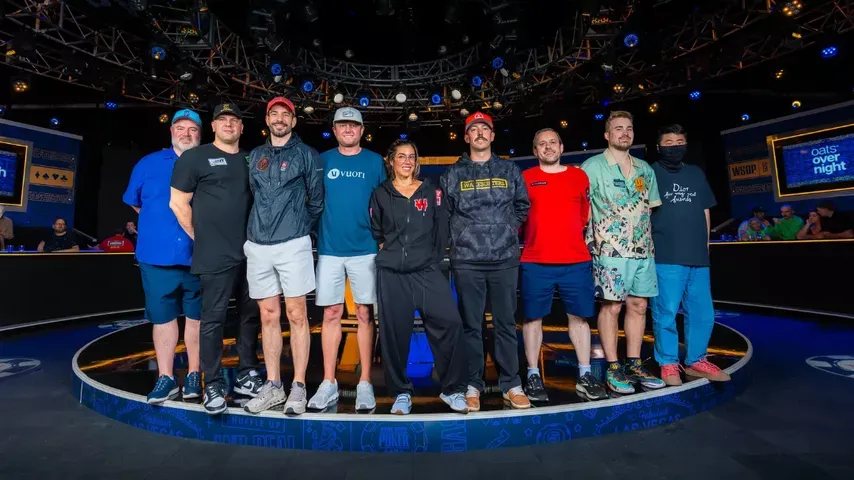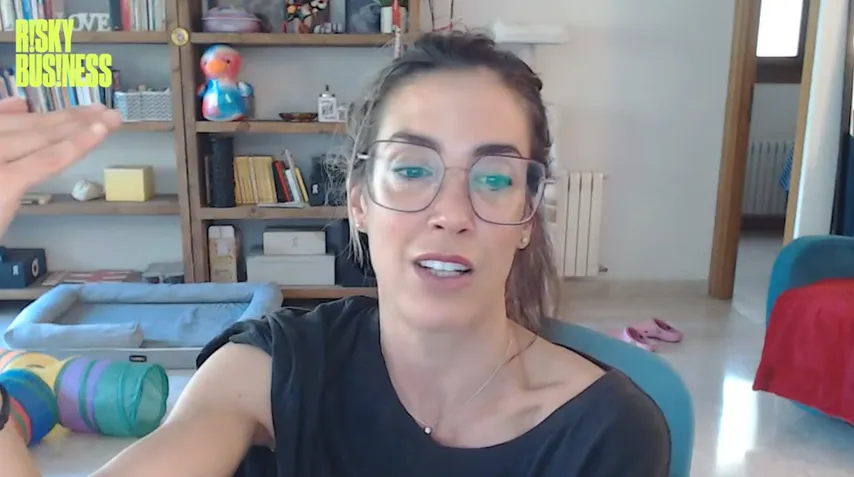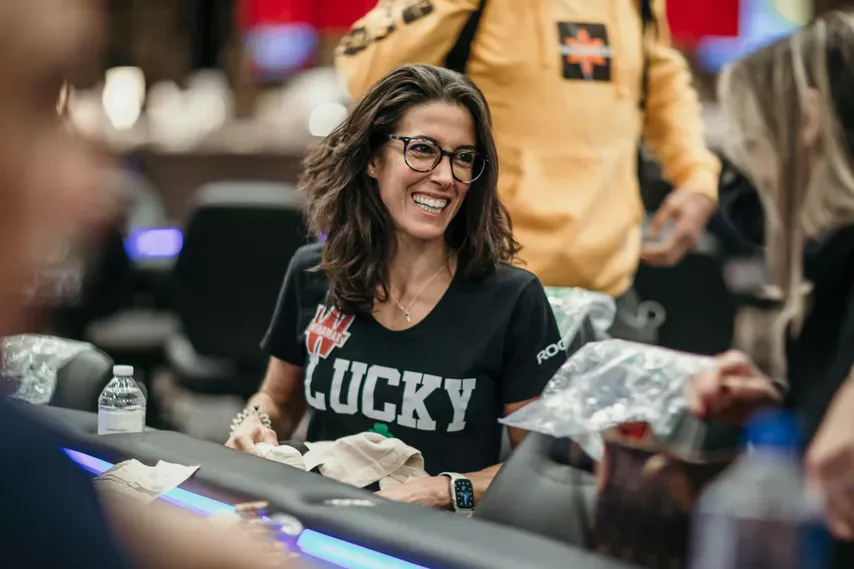Maria Konnikova: Welcome to the show, Leo. We’re so happy to have you.
Leo Margets: Thank you, Maria. Thank you.
Maria: Leo, I think I met you right when I started playing poker about six years ago, but you had already been playing forever. I remember thinking, “Wow, she’s accomplished so much.” Can you start by telling us what this year means to you in the scope of your poker career? You’ve been at it for over a decade.
Leo: Seventeen years, actually. Yeah, I’m a dinosaur. This was my 17th Main Event.
Maria: So Nate and I combined have played fewer Main Events than you have on your own.
Leo: When I say 17 Main Events, it feels surreal. I don’t relate to the number because I have zero burnout with poker. I still love the game, and that love has kept me motivated.

Maria: How did you keep your brain focused in the Main Event without letting outside distractions get to you? The Main is such a long grind if you go deep.
Leo: It’s definitely an energy game. Since about 2018, I’ve tracked myself during long series in an Excel sheet. At the end of each day, I give myself scores in categories like goals, focus, and technical skill. Tracking that helps me stay on course.
It’s like going to the gym. If on day one you squat 100 kilos for 10 reps, by day eight with no rest, you won’t hit the same numbers. We can see that physically, but mentally it’s harder to notice unless we write it down. On day 11 of a series, you might tell yourself you’re giving 100 percent, but maybe it’s really 60 percent of what your true 100 percent could be.
When I start seeing lower score in my daily grades, I take a day off. The improvement the next day is huge. I also write my goals as if I were my “ideal Leo” and ask what she would do. I’ve discovered I need to have fun at the table to play my best.
Along with that, I focus on validating my own decisions. As long as I can explain to myself why I did something, I don’t care about outside judgment. People will always judge. That mindset let me approach each day with zero expectations, zero fear of busting, and zero anxiety about winning. I was just focused on playing each hand as well as I could and enjoying the process.
I’m really proud because I was the version of myself I wanted to be in a spot like this. Of course, I expected to feel some nerves, even at the final table, but it was the kind of nerves I wanted. I was where I wanted to be. It was a great experience.

Nate Silver: One thing you realize—and I haven’t gone as deep as you—when you reach day five or six, the nerves do build. For most players, there’s a point where you’re playing for more money than you ever have, maybe more than you ever will. For me, that inflection point is day four dinner break, when 93 percent of the field is gone and most of my friends are already playing other events.
How did you deal with the increasing stress? Did you try to block it out, or channel it somehow? And did your 2009 deep run help?
Leo: I did run deep my first Main Event, and I’m grateful because I learned what not to do. Back then, I was on my phone too much and too receptive to every comment and dopamine hit from messages. This time, after day six, I stopped opening Instagram and limited my phone use to proactively texting the people I wanted to update—like telling my parents, “I’m alive, I’m doing well, don’t worry.”
I didn’t feel the outside pressure people might expect, even though it had been so long since a woman made the final table. I just wanted to give my best.
The real challenge was that once I made the final table, everyone celebrated as if it was already done. I was thrilled too, but I also knew it was just the beginning. I had an incredible chance to do something even bigger.
The night before the final table, I talked with Adrien Mateos and Steph. Adrien said, “You know you can win this thing, right? And you know you could also bust first hand.” Those words didn’t overwhelm me. I just thought, “Yes, I’m going to play, I’m going to do my best.”
I’m happy I have no regrets about my play or how I handled the moment. I was ready to make mistakes if they happened. Even if pressure had caused an error, I’d have been okay with it as long as I gave my best.
I’m incredibly grateful to have shared it with my close friends, my team, and the poker community. After everything was over, I realized how many people had been rooting for me. It’s such a unique feeling to be in a spot where you can feel that energy. Michael’s mom came up to me on my way to the final table and said, “My heart is divided because my son is also there, but I really want you to do well.” Moments like that are so special. We all have people who love and support us, but life doesn’t always give them the chance to show it in such an incredible way.
Maria: Something you said earlier really stands out, and I think it’s worth pointing out for everyone, including our listeners. Watching you at the final table, you were obviously focused, but you were also having a blast. That energy was visible, and I think that’s such an important reminder. Poker is a phenomenal way to learn how to think better and develop as a person, but it’s still a game. It’s supposed to be fun. I’d like to think that part of your exceptional performance came from genuinely enjoying yourself.
Leo: Yes. I can’t speak for everyone, but for me, poker is also a tool to know myself better. After 17 years of playing seriously, I’ve realized I give my best when I’m having fun. We’re lucky to put our time, energy, and effort into a game. Games exist to be enjoyed. It’s the same as when I train in the gym—I have fun, which is why I stick with it. With poker, it was different this year. I don’t think I’ve ever had this much fun before. Out of roughly 90 hours of play, there were maybe two hours when I didn’t enjoy myself.
During those moments, I noticed myself rushing decisions. I remember one hand against Michael where I snap folded just to avoid the discomfort. But poker is full of uncomfortable spots, especially at high levels. In the early days of the series, I was so in the zone that I actually wanted to face those situations. They’re part of the game. If you try to avoid them, you can’t perform at your best. You can’t only choose easy spots. I reminded myself to embrace discomfort. I became curious and even looked forward to it, knowing it would make me a better player.
Maria: I love that you’re pointing out the importance of taking your time. I struggle with this too. I’m a fast player, and I don’t like tanking. I’ll even call the clock on people. But sometimes, I’ve made big mistakes because I acted too quickly. It’s easy to snap fold or snap call without making sure you’ve considered everything. In poker and in life, we often act without taking that extra moment to think things through. I’m glad you’ve brought that up.
Leo: Yes, that was one of my leaks, and one of the areas I rate myself on each day. I know some of my mistakes came from playing too fast. I believe I can think well, and of course there’s always room for improvement, but if I make a mistake, I want it to be because there’s something I didn’t know—not because I didn’t give myself the time to reach the right decision. Sometimes all it takes is a couple more minutes.
Nate: That gap between the “ideal Leo” and the actual one is something every player can relate to. We’ve all had hands where, in the moment, we think, “If I were a really good player, I’d fold here” or “I’d turn this hand into a bluff.” But we’re tired, we don’t push ourselves, and we let the spot pass. Did you have a big stack early in the Main, or when did you start thinking you could make the final table?
Leo: Never. I was just focusing on each hand. That’s the beauty of it—I had no expectations. The goal was simply to play my best. That’s why I’m proud. I didn’t spend the tournament thinking, “I’m going to make the final table.” And then suddenly, there I was.
Maria: Obviously, people will talk about this as a historic moment—the first time in 30 years, the first in the modern era. And while Barbara Enright’s run was incredible, getting through 200 players is very different from getting through 10,000. Now that it’s over, does it feel like a big deal to you? Will it change how you approach your career, or is it just another tournament you went deep in before moving on to the next?
Leo: It’s on to the next, but I’m enjoying the experience. We’ve all dreamed of this, and I was living it, so I wanted to savor it. But I don’t feel like I represent all women in poker. I’m happy if anyone—woman, man, whoever—feels inspired by what I did, but each person represents themselves. I do feel honored if my run inspires someone, but I wouldn’t claim to speak for everyone.
As for how it changes things, honestly, I feel less motivated to play small buy-in events like $1Ks. But beyond that, I’m not going to suddenly chase super high rollers or take a year off. I’ll keep grinding as I have been. I’m lucky to love the game and to love working on getting better.
I’m very well surrounded, and I think it’s key to be able to talk hands and really think poker. But no, I’m lucky in that it’s not going to change much for me.
Nate: By the way, there’s a day break before the final table, right? How did you spend that time? Were you prepping, taking care of friends, sleeping, or just relaxing by the pool?
Leo: I treated it like another day of the Main Event—just without the cards. My approach was, this isn’t a day off, it’s a Main Event day, we’re just not playing. I stuck to my routine. And believe it or not, the day I slept the best out of all of Vegas was the day before the final table. I slept nine hours.
That’s unbelievable.
I couldn’t believe it either, but it shows how relaxed and happy I was to be there. It also gave me confidence, knowing I was well-rested. I kept things very calm—trained in the morning, went for lunch, avoided too much socializing. I’m a bit of an introvert anyway, so I needed the time for myself. I had a meeting with Adrien Mateos and Steph for a couple of hours, then dinner alone at 8, and I was in bed by 9:30.

Nate: Maria and I actually wanted you on the show more than the man who won the Main Event, Michael Mizrachi. If he wants to come on later, that’s fine, but what was it like to play against him?
Leo: I liked his vibe. He’s so uncomfortable to have at the table, which I mean as the biggest compliment. At certain points, I could tell he was picking on me—being extra aggressive, putting in more bluffs against me than against other players. I saw in the hand histories that he cut down on bluffs with others, but kept going after me. It didn’t bother me—it’s poker, and it worked for him. We didn’t talk much, but sometimes you just like the energy someone brings. I liked his.
Maria: Having Adrien Mateos on your rail meant you had one of the sharpest minds in poker supporting you. Did you two talk about the dynamic with “The Grinder,” or any specific player strategies?
Leo: He was great. He told me I could message him any time, day or night, if I had doubts. I felt supported by the whole team, but especially by Adrien Mateos. We mostly talked about handling the spot itself—being in a position that could feel overwhelming. He saw I had confidence, so his advice mostly validated my approach for the day.
Maria: It’s inspiring not just because of how far you went, but because of how you played. You were smiling, having a good time, and not afraid to put it out there—running big bluffs, making big calls. Sure, you can think back to the nines hand, but that happens. Everyone’s been in that spot.
Leo: The less worried you are about making mistakes, the less perfectionist you are, the more tolerant you become of errors—and paradoxically, the fewer mistakes you make.

Maria: Do you have any parting words of wisdom? You’ve already shared so much, but anything else you want to add?
Leo: Mostly, I want to say thank you again. I’ve never felt so supported. So many people reached out to ask how I was doing, and I could feel their energy. It’s so much better when it’s shared. Just like you shouldn’t take too seriously the negative comments from people you don’t know, you also shouldn’t get swept away by the positive ones. Keep a little distance from both.
Something I remind myself in bad moments also applies now: this too shall pass. Right now I might seem like a superhero and everything is great, but at the end of the day, I’m much more than just my poker results. I don’t create my identity from playing, and I think that’s healthy for anyone—whether you play for a living or for fun. Things will go well, things will go badly, but you’re still you. Your results shouldn’t be what validates you.
Maria: That’s a wonderful message to end on, and one I think contributed to your success this year. For the record, we don’t see you as defined by your results—but congratulations on an incredible result! It was a pleasure watching you and rooting for you, and we’re so glad you joined us.
Leo: I had a great time chatting too. I hope we’re both deep in the Main Event in Barcelona.




















